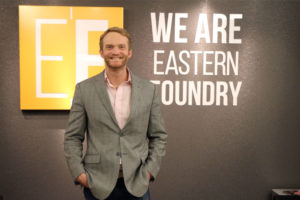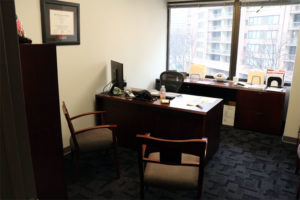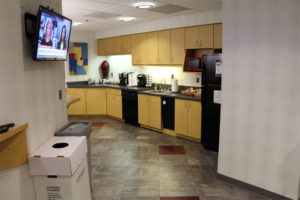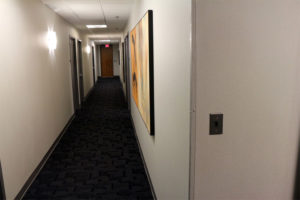Editor’s Note: Sponsored by Monday Properties and written by ARLnow.com, Startup Monday is a weekly column that profiles Arlington-based startups and their founders. The Ground Floor, Monday’s office space for young companies in Rosslyn, is now open. The Metro-accessible space features a 5,000-square-foot common area that includes a kitchen, lounge area, collaborative meeting spaces, and a stage for formal presentations.
 Eastern Foundry, a new startup incubator focusing on government contractors as tenants, launched on Dec. 16. With 70 offices covering 21,000 square feet, it’s already 85 percent full.
Eastern Foundry, a new startup incubator focusing on government contractors as tenants, launched on Dec. 16. With 70 offices covering 21,000 square feet, it’s already 85 percent full.
Eastern Foundry CEO and Founder Geoff Orazem said he expects to be full in his space on the fourth floor of 2011 Crystal Drive by “mid-February at the latest.” Its occupancy rate is just one example of the sweet spot his company has found in its sector.
Taking a walk through the halls of Eastern Foundry belies the future the company envisions. Outside a few of the office doors are framed fact sheets about the companies inside, with photos and bios, plus the company’s mission, relationships within the federal government and former jobs where the workers may still have contacts. These sheets will soon be outside every office, and are a resource for companies looking for partners or advice.
Every Thursday, Eastern Foundry hosts a seminar on issues government contractors face, led by a working expert in the field. These topics have already included GSA scheduling, and the ins-and-outs of Small Business Administration set-aside mandates. Eastern Foundry is also using the 10th floor of the Vornado-owned building — currently a vacant 40,000-square foot space — and turned it into an event space and flexible area for some of its tenants.
 “No one has integrated residential, community and business development the way we have,” Orazem told ARLnow.com. He said Eastern Foundry is the first government-contractor-only incubator in the country.
“No one has integrated residential, community and business development the way we have,” Orazem told ARLnow.com. He said Eastern Foundry is the first government-contractor-only incubator in the country.
Orazem is a former U.S. Marine Corps infantry platoon commander and graduate of Harvard Law School, but realized he wanted to help facilitate business success while working to set up a “tribally run trucking cooperative with government contracts” in Iraq and Afghanistan around 2009.
“We were having an amazing impact on development and security in the area,” he said. “I had far more influence by creating jobs than I ever did as a Marine.”
He spent three years working for McKinsey & Company in D.C. before he decided to try to start his own contracting firm in January. The process, he said, was far more onerous than he had imagined, and his background as a veteran and his “fancy named” college degree didn’t help.
“It wasn’t hard for reasons I thought were good reasons,” he said. “It was difficulty with the process. It was bewildering, bureaucratic, obfuscating and infuriating.”
 Orazem realized the opportunity was there to help people like him get through the process. During a meeting with a friend at 1776 in D.C., he saw how collaboration was working for tech startups, and had a “mini-breakthrough.” He realized a cooperative space could have the same impact for contractors as it does for young tech companies.
Orazem realized the opportunity was there to help people like him get through the process. During a meeting with a friend at 1776 in D.C., he saw how collaboration was working for tech startups, and had a “mini-breakthrough.” He realized a cooperative space could have the same impact for contractors as it does for young tech companies.
Orazem hired Andy O’Brien at Jones Lang LaSalle to broker a real estate deal, and Vornado started aggressively pursuing Orazem to consider Crystal City.
“Vornado basically made us an offer we couldn’t refuse,” he said. “We’re really excited about the area and the vision of Vornado to recreate it as a technology and innovation center. They were really putting their money where their mouth was.”
Orazem said it’s amazing that he’s already being forced to think about growth plans when “I’ve been taking meetings about which paint colors to choose.” He said as he continues to field interest, he plans to continue to grow in the 2011 Crystal Drive building — which is rife with vacancies, as are many offices in Crystal City — potentially taking up to 100,000 square feet of space.
 “We’re just going to gobble up space in this building,” he said. “In the future maybe we’ll have a satellite office in Tysons Corner and one in a HUB Zone in D.C.”
“We’re just going to gobble up space in this building,” he said. “In the future maybe we’ll have a satellite office in Tysons Corner and one in a HUB Zone in D.C.”
Orazem said collaboration in the contracting space is especially crucial because of how complex the government bid process is, as well as all the different small business requirements each contract comes with. Eastern Foundry allows for “big prime” contractors like Booz Allen Hamilton to walk through its halls and find multiple companies to fit into a large bid proposal.
Even though Eastern Foundry is just weeks old, Orazem said he’s already been contact by the GSA and SBA for help in how the regulations and bid processes could be improved for small businesses.
“We’ve very quickly gone from just business interests to forming a policy advocacy platform,” Orazem said.
All of these rapid successes have been surprising for the first time entrepreneur.
“We ran a couple of cases and we’re basically hitting our most optimistic case,” he said. “It’s been an unmitigated blessing.”


